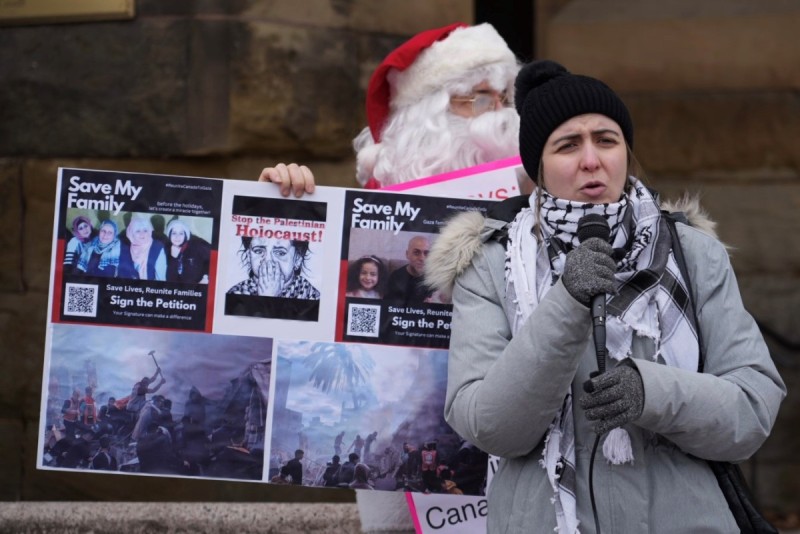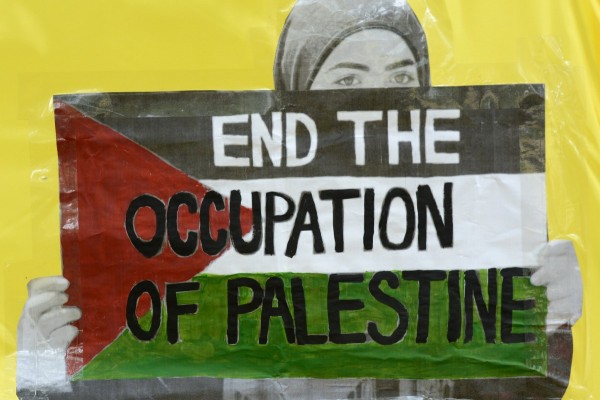Gaza and Canada’s refugee double standard
The Trudeau government’s response to Ukraine was swift and comprehensive. Its approach to Gaza has been timid and hesitant

Jihan Qunoo holding a press conference in front of the Prime Minister’s Office, Ottawa, December 19, 2023. Photo courtesy the Rural Rights Refugee Network.
Nearly 50,000 Palestinians live in Canada. Most arrived here as refugees. They make up a small part of a global Palestinian diaspora, numbering seven million. Witnessing the war from afar evokes helplessness and anguish for those in the diaspora.
Palestinians are a stateless people, 80 percent of them displaced, 50 percent living outside the borders of their historic homeland. The right of return is feeling more and more remote. Many in the diaspora have extended family members or friends currently trapped in Gaza.
Lima Al-Azzeh, a young Palestinian living in Vancouver, recently wrote a column for CBC’s First Person. She wrote about feeling helpless and suffering in silence while awaiting news from family members in Gaza:
And then there are the other silences to contend with. The ones that feel more personal. Noticing who spoke up and who didn’t. Noticing who reached out with a word of support or comfort and who didn’t. Noticing who, over the years, has cared to ask us genuine questions about what it means to be Palestinian. What it feels like to be homesick for your homeland and every day be confronted by the impossibility of your return.
This is the sixth conflict in the past 15 years where Palestinians in Gaza have suffered mass killings by the Israeli military. This war is certainly the most devastating, with the expressed Israeli intent of stamping out Palestinian life. Palestinians are being called “human animals” by far-right Israeli leaders while they are merely trying to survive in the face of mass displacement, unrelenting bombing, ethnic cleansing, the destruction of their homes, a lack of medical care and sanitation, and hunger.
It is hard not to believe that what the world is witnessing in Gaza constitutes the very definition of genocide—a deliberate attempt “to destroy, in whole or in part, a national, ethnical, racial or religious group” by “deliberately inflicting on the group conditions of life calculated to bring about its physical destruction in whole or in part.”
Palestinians can take some solace from a worldwide movement of solidarity which has emerged, including the extraordinary solidarity shown by South Africa. The Palestinian diaspora is playing an important role in helping to mobilize, to speak out, to call for a permanent ceasefire, and to help extended family members and others seek refuge.
In 2019, Jihan Qunoo, then serving as an aid worker in Gaza, became the target of threats from local officials. She fled to Canada as a refugee, forced to make the heartbreaking decision to leave behind her husband and her three young daughters. It took two years and a high-profile public campaign during the pandemic to reunite with her family. Qunoo was supported by Jenny Kwan, NDP MP for Vancouver East, and by the Ottawa-area Rural Refugee Rights Network, an organization which has assisted 14 other Palestinian families.
Since October, 2023, Qunoo has once again been lobbying and organizing, this time on behalf of her siblings to help them escape the horrors of the war in Gaza. Osama Ebid came to Canada in 1994 while all of his siblings stayed behind in Gaza. He is now the organizer of a group of 1,000 Palestinian-Canadians looking to rescue extended family members.
There are hundreds of others like Qunoo and Ebid across Canada. They are being supported by ad-hoc groups of lawyers, legal workers, refugee advocates, and community leaders. Their pleas for help for family members in Gaza are combined with calls for a ceasefire and increased humanitarian assistance.
Palestinian-Canadians initially took encouragement from the support that the Trudeau government offered to Ukrainians in 2022. Less than a month after Russia invaded Ukraine, Trudeau announced a series of programs to help displaced Ukrainians and their families. They were offered extended, temporary status in Canada and the right to work, study and stay until it was safe for them to return home. There was no limit on their numbers. Eventually, over a million Ukrainians were offered visas, with no family connection to Canada required.
By December, the Gaza Family Reunification Project (an ad-hoc collective of immigration and refugee lawyers), the Canadian Association of Refugee Lawyers, the Canadian Council for Refugees, and over 550 Palestinian-Canadian families were calling on the federal government to adopt a similar immigration framework in response to the urgent situation in Gaza.
On December 21, after months of pleas by Palestinian-Canadians and advocates, Immigration Minister Marc Miller finally announced special immigration measures for people from Gaza seeking refuge. They would be offered three-year temporary visas if they met certain eligibility and security requirements. They would only be eligible if they had family members in Canada.
A shocking update came a week later, on December 28, when Miller announced that the special immigration measures for Palestinians would be capped at 1,000 applicants. Families and organizers already had well over that number of names to submit. This was quickly denounced as racist and a double standard by advocates.
The cap means that applicants would be competing with one another, something that MP Kwan likened to “Hunger Games” for refugees.
The different treatment of Ukrainian and Palestinian refugees exposes a clear double standard. The Trudeau government’s response to Ukraine was swift and comprehensive. There was no cap on how many could apply and they did not need to have Canadian relatives. Ottawa eventually received 1,189,320 applications from Ukrainians and approved 936,293, with 210,178 arriving in Canada.
In October, Foreign Affairs Minister Mélanie Joly described Gaza as “one of the worst places on earth to be right now.” Miller called conditions there “unlivable.” Despite recognizing that there is no safe space in Gaza, the response of the Trudeau government both to a ceasefire call and to the refugee crisis has been timid and hesitant, with security concerns being paramount.
In an interview with CBC Ottawa Morning on January 11, Miller stated that “we have extreme security concerns” about this special program, repeating the words “security” and “terrorism” several times.
The application process for refugees from Gaza requires an unprecedented level of personal detail. People are being asked to supply their social media accounts, all previous phone numbers and email addresses, every passport they have ever had, and details about “any scars or injuries which have required medical attention.”
The application form asks for “a full and detailed employment history, since the age of 16 years, including exact dates, description and details on your roles and responsibilities, name(s) of supervisors(s), reason for leaving the job, and any disciplinary issues.”
There’s been a similar pattern with Canada’s treatment of all refugees from the Middle East—including Syria, Afghanistan, Iraq and now Gaza—who are often viewed as potential security threats.
In a recent op-ed for McGill student newspaper The Tribune, Dima Kiwan wrote: “Canada’s inequitable refugee policy reflects more than laziness on behalf of the government—it carries the weight of a racist, and unfortunately common, rhetoric circulating in mainstream media: that Ukrainian refugees, the majority of them white Christian Europeans, will better fit into Canadian society.”
Lest one think this is an aberration, consider that Canada has never enacted any special immigration measures for any people or country in Africa.
These kinds of double standards and not-so-subtle racism have a long history in Canada where immigration and foreign policy have often been in alignment with both corporate and US interests.
The National Council for Canadian Muslims, along with many other organizations, is calling on the federal government to remove the 1,000-person cap on the number of Palestinians who can seek refuge in Canada.
It is imperative to support these calls to lift the cap and expand the eligibility criteria for Palestinians. The government is also being asked to waive any fees and facilitate the evacuation of refugees from Gaza. Above all, people of conscience need to continue calling for a permanent ceasefire, an end to this genocidal war, and a refocus on humanitarian assistance for Gaza.
Ken Theobald is a community worker and anti-poverty activist based in Toronto’s northwest inner suburbs.










